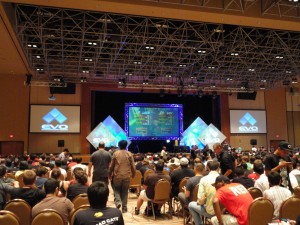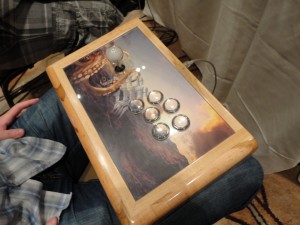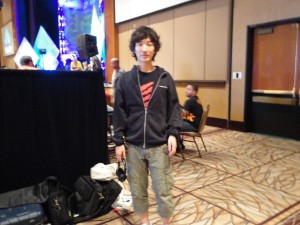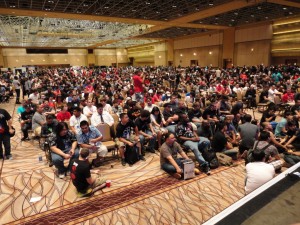A Guide To Becoming A Competitive Gamer
by RayBladeX, HSM guest contributor
You may have watched some of the EVO (Evolution) matches in Home a couple weeks ago and may have thought, “This looks exciting; how do I become a part of this?”
It’s much easier than you think, but you will need some real dedication before jumping in.
First I would like to tell you a little about me. I’ve been playing competitively since 1998. I am both a tournament organizer and player and have entered every EVO event since 2000 (although I missed 2010) and recently finished in the Top 64 for Super Street Fighter 4: Arcade Edition at the 2011 EVO.
With that in mind, here’s a checklist I provided to help you get started.
Pick a game that’s current and is still being played in tournaments.
Super Street Fighter 4: Arcade Edition is a good choice. Why? In EVO’s past, some of the games that were played were anywhere between five to ten years old (Super Street Fighter 2: Turbo for example). It’s perfectly fine to keep playing these older games, but for the best experience, practice a game that happens to have a bunch of people already playing it.
Also, EVO has a Bring Your Own Console (or BYOC) area for those who like to play these older (and sometimes obscure) games, such as TMNT Tournament Fighters.
Why? You only get better by playing people who are the same skill, or better. Don’t be satisfied with being the best on your block. Be the best in your city, state, or country!
If you happen to live in Hawaii, we have a group of nearly 100 online and offline players called the “808 Hawaii SSF4 AE” group on Facebook, which is open to everyone. Hawaii has many great players you may have seen on previous EVO streams, such as “Dagger G,” “Leviathan,” and “Mookmonster.”
Before I moved here in 2010, I used to run quite a few tournaments in the Portland Metro Area in Oregon, most notably the SlugFest Series at Ground Kontrol (www.groundkontrol.com). But since moving to Hawaii, I’ve changed my focus to work, so nowadays I’m more or a tournament player instead of an organizer.
Why? There’s no clear cut winner between pad and stick users; it’s simply a preference. Don’t be pressured into buying a stick unless it really helps you perform better. It’s kind of like how a Pro Bowler would use their own ball instead of the ones provided by the bowling alley. The one that I use is a Madcatz Tournament Edition Joystick, which is made of “Sanwa” parts. It’s a Japanese-style joystick typically seen in arcades; if you can still find one open near you. I prefer it because my right hand has easy access to all six buttons required, and the button layout has a more “natural” layout for your fingers than a normal Sixaxis/DS3 pad would. I grew up playing arcade games, so it comes natural that I would use a joystick for fighting games.
Have an open mind.
Why? To get better at anything in life – including fighting games – you need to be able to take constructive criticism on your play. This is how you will get better. Ask people in your groups what you should or shouldn’t do in matches. The thing I learned the most is that it isn’t your opponent who is doing all these “cheap and dirty” tactics (such as throwing/grabbing), it was me who wasn’t able to counter what was thrown at me. Most of the time, your friends – or rivals – will do something repeatedly on you because it works. If you can’t find a way out, just ask. If your friends won’t answer, seek online info, such as You Tube and shoryuken.com has a lot of resources concerning all aspects of competitive gaming (tested and theory).
Also, watching some You Tube videos of player matches can help your game. Sometimes a player might do something out of the ordinary, like doing a random attack, but sometimes it wasn’t very random at all. Learn why players do what they do, even if it looks goofy or wrong to you.
Why? Sometimes a group will have open or private offline training sessions. If you can, attend as many of these as possible. Online gaming helps, but offline gaming is more social, which makes it a good place to meet others with the same interests and there shouldn’t be lag during your matches.
If there aren’t any gaming sessions in your area, you could also host some yourself. It’s a good idea to get to know your new friends before inviting anyone over though. Some places around the country have what I call “Nerd Bars,” where you can play videogames and have a drink. My favorite here in Hawaii is called Nocturna Lounge, which has gaming & karaoke as well.
Here are a few links to some places I have used around the country:
- www.nocturnalounge.com (Oahu, Hawaii);
- www.groundkontrol.com (Portland, Oregon);
- www.insertcoinslv.com (Las Vegas, Nevada);
- www.bestbout.com (Portland, OR).
Why? Casual matches are great, but many players tend to “hold back” and not play their best. This is when a tournament comes in handy. If there are no tourneys available to you, try and see if your local GameStop will set one up.
If you’re interested in starting one yourself, you’ll need to do several things to get it organized. Here is a list to use as a reference:
- A Venue – This can be a game store, a bar, community room, or even someone’s home.
- Organizers – These are the people who run brackets and promote the tourney (venue).
- Setups – A setup consists of a PS3 or X-box 360, TVs, two joysticks or controllers per console and the games needed. Since many events run more than one game, plan on having four or more setups so things run smoothly. EVO had over thirty setups going on for some games such as Super Street Fighter 4: Arcade Edition.
- Players/Participants – A minimum of sixteen is good. The more players you have for the event the better it is for your event and the venue itself (especially if it’s a bar).
One of my first tourneys was one that I set up myself (in 1992) in Beaverton, Oregon called “ElectricCastle’s Wunderland.” This was for Street Fighter 2: Champion Edition, and I won. Another of my tourneys took place in 1993 at a place called “Games People Play” on 82nd Avenue in Clackamas, Oregon, (I won this one as well).
The special thing about this tourney is that it had a player named “Robin Mihara” who won the local “Nintendo World Championships” Regional event in Portland,Oregon (Which I happened to take Top 10 in). I didn’t know this until more recently; I wish he’d stuck with Street Fighter, as we would’ve been good rivals.
Most cities around the country already have a community. These can be found on shoryuken.com’s forums under “Regional Matchmaking.” You might be surprised that your “scene” already has a few hundred players.
Some of my tourney videos can be found at youtube.com/raybladex and youtube.com/user/bloodyknuckles2010 if you are interested in seeing them. Feel free to ask me any questions here in the comments and I will try to help.
Good luck to anyone who chooses to take on this challenge!







A bar with PS3 games,sounds like heaven.Good advice Ray,I myself often ask others for tips(and freely give them) even if the other person doesn’t have as high a score as I.I don’t believe that you can ever learn too much and what someone else is doing or knows might be just the piece of info. you needed to take your game to the next level.My biggest questions are these,are there any fees to enter the EVO tourney,and other big tourneys?If so what price range?Also do you think tournaments would work on Home?And if so which games in your opinion would work best for that format?
Evolution indeed has some fees, they are:
$50-$70 for Registration/Venue Fees.
$10 per game you wish to compete in.
Airfare/Hotel/Food/etc.
--
Local tournaments closer to you should be much cheaper.
--
Many people within Home have done all sorts of tourneys with prizes such as a psn card being given away. The problem with online tourneys includes:
1: Lag issues.
2: Location/Time Zone
3: Scheduling conflicts.
--
A tournament doesn’t have to be only fighters, the guide written above can be used for many other genres.
The number of setups required and a few rules will need to be adjusted so the event doesn’t take too long to finish.
--
Many organizations such as the World Cyber Games and Major League Gaming have a similar rule set with what EVO and the fighting game community does.
Yeah I know about the user created tourneys in Home,have even set-up a couple myself,but I was thinking about large-scale Sony backed tourneys,sorry should have made that clear.
Sony does do some large scale tourneys, but they’re usually only “one shot” deals like Socom/Mag and other games.
EVO is something that’s been going on for more than 10 years and only grows bigger each year.
I’m in the planning stages for a Home related event at EVO 2012, so we’ll see if we can merge the Home and EVO community somehow)
Congrats on your first, but I hope not last, published HSM article Ray! Great job for a first outing, I hope to see you contribute more to our little band of writers soon. Maybe a game review of a few of the fighting games you have played?
Burbie -- I can do a review of some sort, but it’ll take some time =)
This isn’t in the article but needs to be said:
When you get heavily into a hobby, you may lose track of things around you, such as:
1: Your family
2: Your friends
3: Your significant other
4: Your education
5: Your job/career
6: Your personal health (mental/physical)
Unless this hobby can pay all your bills, it’s very important to keep these above things in check and have a healthy balance.
Thanks for reading!
That is a very good addition to this story, and one of the (many) reasons why my ex is my ex.
Thank you for contributing, Ray.